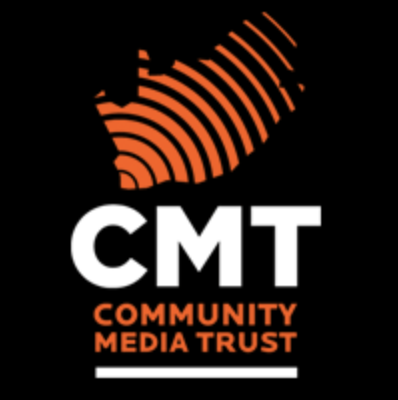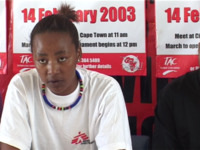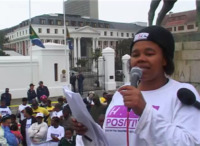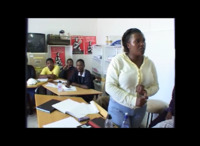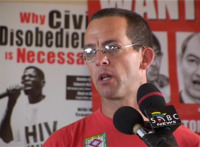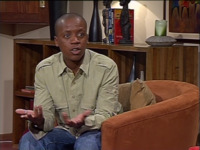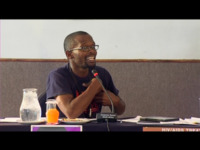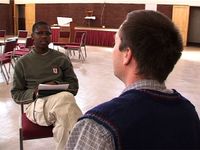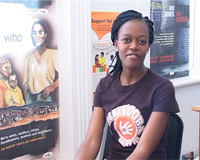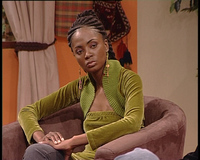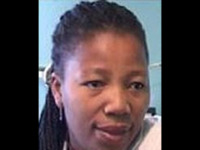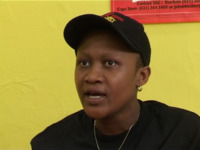-

Jonathan Berger is an advocate of the High Court of South Africa and a member of the Johannesburg Bar. After serving as the legal education and advice officer at the National Coalition for Gay and Lesbian Equality from 1997 to 1999, he clerked for Justice O’Regan of the Constitutional Court of South Africa.
Jonathan also served as a senior researcher and head of policy and research at South Africa’s SECTION27 (formerly known as the AIDS Law Project) from January 2002 to December 2011.  He holds degrees in architecture and law from the University of the Witwatersrand, Johannesburg, as well as a master’s degree in law from the University of Toronto. From June 2009 to December 2011, Jonathan was a member of South Africa’s Medicines Control Council, and chaired its expert legal committee. He currently serves on the board of directors of Health-E News Service, a not-for-profit South African media company, and on the Expert Advisory Group of the Geneva-based Medicines Patent Pool.
-
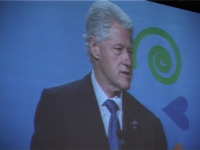
William Jefferson Clinton (né Blythe III; born August 19, 1946) is an American politician and attorney who served as the 42nd president of the United States from 1993 to 2001. Prior to his presidency, he served as governor of Arkansas from 1979 to 1981 and 1983 to 1992 and as attorney general of Arkansas from 1977 to 1979. A member of the Democratic Party, Clinton was known as a New Democrat, and many of his policies reflected a centrist "Third Way" political philosophy. He is the husband of Hillary Clinton, who was the Secretary of State (2009–2013) and ran for president in 2008 and 2016.
Clinton was born and raised in Arkansas and attended Georgetown University, University College, Oxford, and Yale Law School. He met Hillary Rodham at Yale and they were married in 1975. After graduating from law school, Clinton returned to Arkansas and won election as state attorney general, followed by two non-consecutive terms as Arkansas governor. As governor, he overhauled the state's education system and served as chairman of the National Governors Association. Clinton was elected president in 1992, defeating incumbent Republican President George H. W. Bush. At age 46, he became the third-youngest president in history.
Clinton presided over the longest period of peacetime economic expansion in American history. He signed into law the North American Free Trade Agreement (NAFTA) and the Violent Crime Control and Law Enforcement Act, but failed to pass his plan for national health care reform. In the 1994 elections, the Republican Party won unified control of Congress for the first time in 40 years. In 1996, however, he was reelected in a landslide. He passed welfare reform and the State Children's Health Insurance Program, as well as financial deregulation measures. He also appointed Ruth Bader Ginsburg and Stephen Breyer to the U.S. Supreme Court. During the last three years of Clinton's presidency, the Congressional Budget Office reported a budget surplus—the first such surplus since 1969. In foreign policy, Clinton ordered U.S. military intervention in the Bosnian and Kosovo wars, signed the Dayton Peace agreement, signed the Iraq Liberation Act in opposition to Saddam Hussein, participated in the Oslo I Accord and Camp David Summit to advance the Israeli–Palestinian peace process, and assisted the Northern Ireland peace process. In 1998, Clinton was impeached by the House of Representatives, becoming the second U.S. president to be impeached. The impeachment was based on accusations that Clinton committed perjury and obstruction of justice for the purpose of concealing his affair with Monica Lewinsky, a 22-year-old White House intern. He was acquitted by the Senate and completed his second term in office.
-
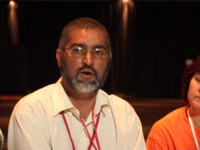
Qualifications
MBBCh FCPaed DCH Dip HIV Man
Current posts
Academic Head of Department : Paediatrics and Child Health
University of the Witwatersrand
Head of Department of Paediatrics and Child Health, Rahima Moosa Mother and Child Hospital
Portfolios
Faculty Exec and Board (Wits), Professional and Ethical Standards Committee (Wits), Gauteng Provincial Health Research Committee, Child and Adolescent Subcommittee of the Southern African HIV Clinician’s Society, Sector Leader – Children’s Sector (Yezingane Network) of the South African National AIDS Council
Biosketch
Ashraf is a Chief Specialist and Head of Department of Paediatrics and Child Health at the Rahima Moosa Mother and Child Hospital where he has been working since February 1998.
Professional interests
HIV, Paediatric Emergency Medicine and Resuscitation, Mobile technology in the clinical space
-
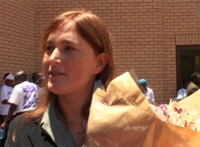
Susannah Cowen has been practising as an advocate since 2001. She started practising in Cape Town and, in 2010, moved to Johannesburg. She took silk in July 2018. Her preferred areas of practice are commercial law, constitutional law, administrative law, land law and customary law. She has appeared in the Constitutional Court, the Supreme Court of Appeal, the High Court (various divisions), the Land Claims Court and regulatory tribunals. She has acted as a Judge in the High Court in Johannesburg.
Susannah holds BA and LLB degrees from the University of Cape Town and a BCL degree from the University of Oxford. In 2000 she clerked at the Constitutional Court for then President of that Court, Justice Arthur Chaskalson.
-

Patricia de Lille (née Lindt; born 17 February 1951) is a South African politician who is the current Minister of Public Works and Infrastructure and leader of the political party Good. She was previously Mayor of Cape Town from 2011 to 2018, and Western Cape Provincial Minister of Social Development from 2010 to 2011. She founded and led the Independent Democrats (ID), a political party which she formed in 2003 during a floor-crossing window, after she broke away from the Pan Africanist Congress (PAC). In August 2010, the ID merged with the Democratic Alliance, South Africa's official opposition, and the party was officially dissolved in 2014. From 2015 to 2017, she was Provincial Leader of the Democratic Alliance in the Western Cape.
De Lille was selected as the DA's mayoral candidate in Cape Town, defeating incumbent Dan Plato, ahead of the 2011 local government elections, where she was elected mayor. She was re-elected to a second term as mayor in the 2016 local government elections.
De Lille was voted 22nd in the Top 100 Great South Africans, and is noted for her role in investigations into the country's controversial Arms Deal.
On 8 May 2018, the DA's Federal Executive ceased De Lille's party membership, thereby removing her as mayor of the DA governed city. The Western Cape High Court temporarily suspended her removal. On 5 August 2018, De Lille announced her intention to resign as Mayor of Cape Town. She resigned as mayor and terminated her DA party membership on 31 October 2018.
Consequently, she formed Good in December 2018, and was announced as the party's Western Cape Premier candidate in February 2019. She was elected to Parliament in May 2019 and took office as a Member on 22 May 2019. On 29 May 2019, De Lille was appointed by President Cyril Ramaphosa as Minister of Public Works and Infrastructure.
-

-

Nkosazana Clarice Dlamini-Zuma (née Dlamini; born 27 January 1949), sometimes referred to by her initials NDZ, is a South African politician, doctor and anti-apartheid activist, currently serving as Minister of Cooperative Governance and Traditional Affairs. She was South Africa's Minister of Health from 1994 to 1999, under President Nelson Mandela, Minister of Foreign Affairs, under both President Thabo Mbeki and President Kgalema Motlanthe, Minister of Home Affairs in the first term of former President Jacob Zuma (with whom she was previously married for 16 years) and Minister in the Presidency for the National Planning Commission for Policy and Evaluation under President Cyril Ramaphosa.
On 15 July 2012, Dlamini-Zuma was elected by the African Union Commission as its chairperson, making her the first woman to lead the organisation or its predecessor, the Organisation of African Unity; she took office on 15 October 2012. On 30 January 2017, she was replaced as Chairperson of the AU Commission by Chadian Foreign Minister Moussa Faki.
She ran for the position of President of the African National Congress in 2017 but was defeated by Cyril Ramaphosa at the 54th National Conference of the African National Congress.
-

Anthony Stephen Fauci (/ˈfaʊtʃi/; born December 24, 1940) is an American physician-scientist and immunologist who serves as the director of the U.S. National Institute of Allergy and Infectious Diseases (NIAID) and the chief medical advisor to the president.
As a physician with the National Institutes of Health (NIH), Fauci has served the American public health sector in various capacities for more than 50 years, and has acted as an advisor to every U.S. president since Ronald Reagan.[1] He became director of the NIAID in 1984 and has made contributions to HIV/AIDS research and other immunodeficiency diseases, both as a research scientist and as the head of the NIAID. From 1983 to 2002, Fauci was one of the world's most frequently-cited scientists across all scientific journals. In 2008, President George W. Bush awarded Fauci the Presidential Medal of Freedom, the highest civilian award in the United States, for his work on the AIDS relief program PEPFAR.
During the COVID-19 pandemic, Fauci was one of the lead members of President Donald Trump’s White House Coronavirus Task Force. Currently Fauci is the Chief Medical Advisor to President Joe Biden, officially appointed in 2021.
-
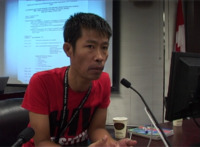
Loon Gangte works for the International Treatment Preparedness Coalition, as a regional coordinator for South Asia. He is also the founder of the Delhi Network of Positive People, that is a network of people living with HIV/AIDS, based in Delhi.
-

William Henry Gates III (born October 28, 1955) is an American business magnate, software developer, investor, author, and philanthropist. He is a co-founder of Microsoft Corporation, along with his late childhood friend Paul Allen. During his career at Microsoft, Gates held the positions of chairman, chief executive officer (CEO), president and chief software architect, while also being the largest individual shareholder until May 2014. He is considered one of the best known entrepreneurs of the microcomputer revolution of the 1970s and 1980s.
Gates was born and raised in Seattle, Washington. In 1975, he and Allen founded Microsoft in Albuquerque, New Mexico. It became the world's largest personal computer software company. Gates led the company as chairman and CEO until stepping down as CEO in January 2000, succeeded by Steve Ballmer, but he remained chairman of the board of directors and became chief software architect. During the late 1990s, he was criticized for his business tactics, which have been considered anti-competitive. This opinion has been upheld by numerous court rulings. In June 2008, Gates transitioned to a part-time role at Microsoft and full-time work at the Bill & Melinda Gates Foundation, the private charitable foundation he and his wife, Melinda Gates, established in 2000. He stepped down as chairman of the board of Microsoft in February 2014 and assumed a new post as technology adviser to support the newly appointed CEO Satya Nadella. In March 2020, Gates left his board positions at Microsoft and Berkshire Hathaway to focus on his philanthropic efforts including climate change, global health and development, and education.
Since 1987, Bill Gates has been included in the Forbes list of the world's wealthiest people. From 1995 to 2017, he held the Forbes title of the richest person in the world every year except from 2010 to 2013. In October 2017, he was surpassed by Amazon founder and CEO Jeff Bezos, who had an estimated net worth of US$90.6 billion compared to Gates's net worth of US$89.9 billion at the time. As of May 2021, Gates had an estimated net worth of US$144 billion, making him the fourth-richest person in the world.
Later in his career and since leaving day-to-day operations at Microsoft in 2008, Gates has pursued many business and philanthropic endeavors. He is the founder and chairman of several companies, including BEN, Cascade Investment, bgC3, and TerraPower. He has given sizable amounts of money to various charitable organizations and scientific research programs through the Bill & Melinda Gates Foundation, reported to be the world's largest private charity. Through the foundation, he led an early 21st century vaccination campaign which significantly contributed to the eradication of the wild poliovirus in Africa. In 2010, Gates and Warren Buffett founded The Giving Pledge, whereby they and other billionaires pledge to give at least half of their wealth to philanthropy.
-

Melinda French Gates is an American philanthropist, and a former general manager at Microsoft. French Gates has consistently been ranked as one of the world's most powerful women by Forbes.
In 2000, she and her husband Bill Gates co-founded the Bill & Melinda Gates Foundation, the world's largest private charitable organization as of 2015. She and her husband have been awarded the US Presidential Medal of Freedom and the French Legion of Honour.
-
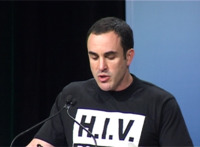
Gregg Gonsalves (born October 21, 1963) is a global health activist, an epidemiologist, an associate professor at Yale School of Public Health and an associate professor (adjunct) at Yale Law School
-
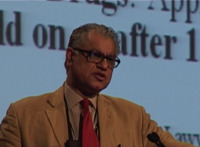
Anand Grover is a senior lawyer known for legal activism in Indian law relating to homosexuality and HIV. Along with his wife Indira Jaising, he is a founder-member of the Lawyers Collective. He was the United Nations Special Rapporteur on the right to health from August 2008 to July 2014. He is currently and acting member of the Global Commission on Drug Policy.
-

Barbara Hogan is a former Minister of Health and of Public Enterprises in the Cabinet of South Africa. Hogan joined the African National Congress in 1976 after the Soweto Uprising, many years after the organisation had been declared illegal and had moved its activities underground. Her responsibilities in this movement were to mobilise the white political left, participate in public political campaigning and supply the ANC underground in Botswana with information about trade union and community activity in South Africa. Hogan was detained in 1982 for ‘furthering the aims of a banned organisation’ and after being interrogated, ill-treated and held in solitary confinement for one year, she became the first woman in South Africa found guilty of high treason[3] and was sentenced to ten years in prison.
Hogan was released in 1990 with the unbanning of outlawed organisations and together with other political prisoners, most notably Nelson Mandela. Upon release she played a pivotal role in restructuring the ANC in her capacity as secretary of the PWV regional office.
-

Richard Charles Horton FRCP FMedSci (born 29 December 1961) is editor-in-chief of The Lancet, a United Kingdom–based medical journal. He is an honorary professor at the London School of Hygiene and Tropical Medicine, University College London, and the University of Oslo.
After studying medicine at the University of Birmingham, he joined the liver unit at London's Royal Free Hospital. In 1990, he became assistant editor of The Lancet and five years later become its editor-in-chief in the UK.
He has been a medical writer for The Observer, The Times Literary Supplement and The New York Review of Books. In 2003, he published Second Opinion: Doctors, Diseases and Decisions in Modern Medicine, a book about controversies in modern medicine. In 2005 he wrote "Doctors in society: medical professionalism in a changing world", an inquiry into the future of medical professionalism, for the Royal College of Physicians. He has served in various roles with the World Health Organization (WHO).
-

-
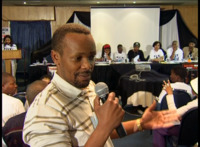
Kgosi Letlape, an ophthalmologist from South Africa, is president of the Health Professions Council and chairman of the Medical and Dental Board of South Africa. He is the current president of the Africa Medical Association and the president of Association of Medical Councils of Africa. He is also past chairman of the board of the South African Medical Association (SAMA) and past president of the World Medical Association (WMA), the global representative body for physicians.
He was admitted as a fellow of the College of Surgeons of South Africa in April 1988 and as a fellow of the Royal College of Surgeons of Edinburgh for ophthalmology in May 1988. He has the distinction of being the first black African to qualify as an ophthalmologist in Southfield, South Africa, and the first to become president of the WMA.
He is the former executive director of the Tshepang Trust (2002 to 2013), a not-for-profit organization that pioneered the provision of treatment for HIV and AIDS patients in partnership with state hospitals, an initiative he initiated through the SAMA at the request of the late President Nelson Mandela with a bequest from the Nelson Mandela Foundation and funding from the Presidential Emergency Programme for AIDS Relief through the Centre for Disease Control and Prevention.
He is a health care activist who believes that everyone in South Africa has a right to and deserves to receive equal health care, and that a lot of today’s illnesses can be prevented. To that end he co-founded the Africa Harm Reduction Alliance, whose aim is to create awareness and educate about the need to reduce harm and promote well-being.
Letlape is an avid golfer who lives in Johannesburg with his wife, children and grandchildren.
-

Prudence Nobantu Mabele (21 July 1971 – 10 July 2017) was a South African activist who advocated for the rights of women and children living with HIV/AIDS, and against gender-based violence. She was diagnosed with HIV/AIDS in 1990 and went public with her status in 1992. She set up the Positive Women's Network in 1996. She worked with UNAIDS and also qualified as a sangoma. She was the recipient of many awards, including the Felipa de Souza award in 1999. In 2004, she carried the Olympic flame. She died in 2017 and in her memory the International AIDS Society set up an annual prize for gender activists.
-
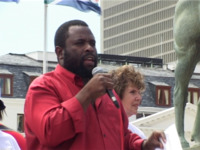
William Mothipa Madisha is a South African trade unionist and politician. Madisha is the former President of both the Congress of South African Trade Unions (from 1999 to 2008) and the South African Democratic Teachers Union (from 1996 to 2008). Madisha grew up in Atteridgeville, Pretoria, South Africa, where he was a member of the United Democratic Front. He studied teaching at Transvaal College of Education.
Madisha was fired from his position as COSATU president and expelled from the organisation on 27 February 2008; he was also fired from SADTU on 29 July 2008. He had been under suspension since the second half of 2007 while a probe into the disappearance of a large cash donation was being carried out by COSATU; he had received the suspension for making public allegations concerning the estimated R500,000 donation from businessman Charles Modise to the South African Communist Party. He also was expelled from the SACP's central committee.
A noted dissenter from the predominant opinion of COSATU, he had publicly backed Thabo Mbeki for the presidency at the African National Congress's 2007 national conference in Polokwane while the trade union federation had adopted a resolution backing Jacob Zuma. He currently backs the Congress of the People (COPE) breakaway party being formed by Mosiuoa Lekota, the former defence minister in Mbeki's second government.
Madisha was elected to the National Assembly in the 2009 Elections as a COPE MP.
-

Nozizwe Charlotte Madlala-Routledge (born 29 June 1952) is a South African politician who was South Africa's Deputy Minister of Defence from 1999 to April 2004 and Deputy Minister of Health from April 2004 to August 2007. President Thabo Mbeki dismissed her from the Cabinet on 8 August 2007, after which she maintained her role as a member of parliament representing the African National Congress. On 25 September 2008, she became Deputy Speaker of the National Assembly, serving in that capacity until resigning from Parliament in early May 2009. She has been a member of the South African Communist Party since 1984.
Madlala-Routledge is well known for helping combat AIDS in South Africa, and is considered by many to have resisted government denial of the severity of the epidemic.[4] She was also an opponent of the use of alternative medicine treatments of HIV in place of scientifically tested methods.
More recently, Madlala-Routledge served for a short period as the executive director of Inyathelo: The South African Institute for Advancement until March 2015 when she resigned following problems with the board.






















